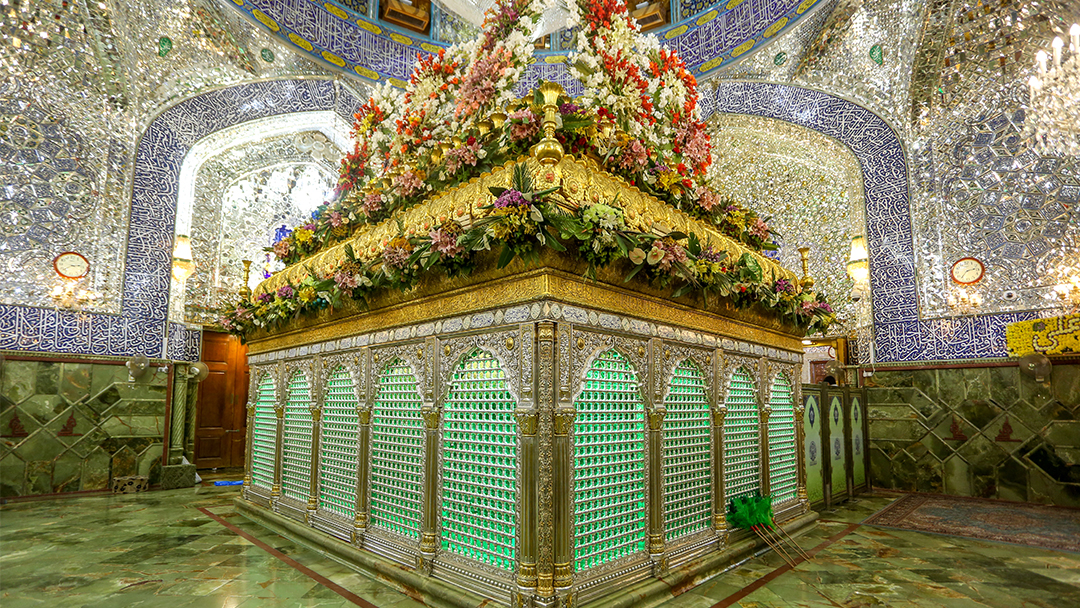Amir al-mu’minin Ali – upon whom be peace – was the son of Abu Talib, the Shaykh of the Banu Hashim. Abu Talib was the uncle and guardian of the Holy Prophet and the person who had brought the Prophet to his house and raised him like his own son. After the Prophet was chosen for his prophetic mission, Abu Talib continued to support him and repelled from him the evil that came from the infidels among the Arabs and especially the Quraysh.
According to well-known traditional accounts Ali was born ten years before the commencement of the prophetic mission of the Prophet. When six years old, as a result of famine in and around Mecca, he was requested by the Prophet to leave his father’s house and come to the house of his cousin, the Prophet. There he was placed directly under the guardianship and custody of the Holy Prophet.
A few years later, when the Prophet was endowed with the Divine gift of prophecy and for the first time received the Divine revelation in the cave of Hira’, as he left the cave to return to town and his own house he met Ali on the way. He told him what had happened and Ali accepted the new faith.
Again in a gathering when the Holy Prophet had brought his relatives together and invited them to accept his religion, he said the first person to accept his call would be his vicegerent and inheritor and deputy. The only person to rise from his place and accept the faith was Ali and the Prophet accepted his declaration of faith.
Therefore Ali was the first man in Islam to accept the faith and is the first among the followers of the Prophet to have never worshipped other than the One God.
Ali was always in the company of the Prophet until the Prophet migrated from Mecca to Medina. On the night of the migration to Medina (hijrah) when the infidels had surrounded the house of the Prophet and were determined to invade the house at the end of the night and cut him to pieces while he was in bed, Ali slept in place of the Prophet while the Prophet left the house and set out for Medina.
After the departure of the Prophet, according to his wish Ali gave back to the people the trusts and charges that they had left with the Prophet… .
In Medina also Ali was constantly in the company of the Prophet in private and in public. The Prophet gave Fatimah, his beloved daughter from Khadijah, to Ali as his wife and when the Prophet was creating bonds of brotherhood among his companions he selected Ali as his brother… .
He never disobeyed the Prophet, so that the Prophet said, “Ali is never separated from the Truth nor the Truth from Ali.”… .
During his caliphate of nearly four years and nine months, Ali followed the way of the Prophet and gave his caliphate the form of a spiritual movement and renewal and began many different types of reforms… .
According to the testimony of friend and foe alike, Ali had no shortcomings from the point of view of human perfection. And in the Islamic virtues he was a perfect example of the upbringing and training given by the Prophet.
The discussions that have taken place concerning his personality and the books written on this subject by Shi’ites, Sunnis and members of other religions, as well as the simply curious outside any distinct religious bodies, are hardly equaled in the case of any other personality in history.
In science and knowledge Ali was the most learned of the companions of the Prophet, and of Muslims in general. In his learned discourses he was the first in Islam to open the door for logical demonstration and proof and to discuss the “divine sciences” or metaphysics (ma’arif-i ilahiyah).
He spoke concerning the esoteric aspect of the Quran and devised Arabic grammar in order to preserve the Quran’s form of expression. He was the most eloquent Arab in speech.
The courage of Ali was proverbial… . Never did a warrior or soldier engage Ali in battle and come out of it alive. Yet, with full chivalry he would never slay a weak enemy nor pursue those who fled. He would not engage in surprise attacks or in turning streams of water upon the enemy.
It has been definitively established historically that in the Battle of Khaybar in the attack against the fort he reached the ring of the door and with sudden motion tore off the door and cast it away.
Also on the day when Mecca was conquered the Prophet ordered the idols to be broken. The idol “Hubal” was the largest idol in Mecca, a giant stone statue placed on the top of the Ka’bah. Following the command of the Prophet, Ali placed his feet on the Prophet’s shoulders, climbed to the top of the Ka’bah, pulled “Hubal” from its place and cast it down. Ali was also without equal in religious asceticism and the worship of God… .
There are many stories told of Ali’s kindness to the lowly, compassion for the needy and the poor, and generosity and munificence toward those in misery and poverty. Ali spent all that he earned to help the poor and needy, and himself lived in the strictest and simplest manner.
Ali loved agriculture and spent much of his time digging wells, planting trees and cultivating fields. But all the fields he cultivated or wells that he built he gave in endowment (waqf) to the poor. His endowments, known as the “alms of Ali,” had the noteworthy income of twenty-four thousand gold dinars toward the end of his life.
SHI’ITE ISLAM, Allamah Sayyed Muhammad Husayn Tabatabai, Translated and Edited by Seyyed Hossein Nasr


